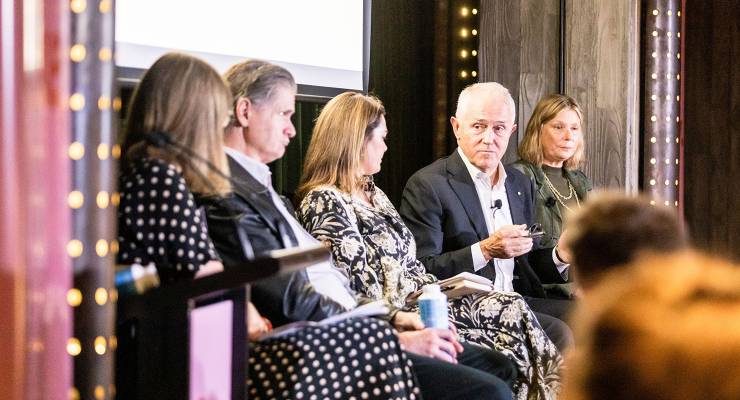
Nine newspapers can “hardly complain” they were sued by disgraced former soldier Ben Roberts-Smith, says former prime minister Malcolm Turnbull.
He was a panellist at a Crikey event on Tuesday night where the news outlet celebrated subscribers, readers and supporters who had helped fund its defence against a defamation action brought by News Corp co-chairman Lachlan Murdoch.
Turnbull took part in a wide-ranging onstage discussion on issues such as media reform, defamation law and freedom of speech, and said it was somewhat unusual for the plaintiff in a libel suit to be more well-resourced than the defendants.
“In most cases in defamation, the plaintiff has much less financial resources than the defendant,” he said. “This case, Lachlan Murdoch v Crikey, is really very unusual — a multibillionaire suing a small publisher.
“Typically in defamation, it’s an individual suing a media company which has much greater resources. News Corp or Fairfax, or the ABC for that matter, are professional defendants … They get sued all the time.”
He brought up Roberts-Smith’s suit against Nine newspapers, for alleging the Victoria Cross recipient was a war criminal, as an exception to the norm: “Ben Roberts-Smith is sort of a borderline one, because of the support he had from Kerry Stokes.
“But having said that, if you accuse someone of being a murderer, and they believe they’re not a murderer, you can hardly complain if they sue you for defamation.”
Turnbull shared the stage with Greens Senator Sarah Hanson-Young, Alliance for Journalists’ Freedom chief executive Lesley Power and Crikey’s political editor Bernard Keane. Crikey’s editor-in-chief, Sophie Black, moderated the discussion.
Keane, who wrote the story Murdoch sued Crikey over and who was one of the defendants, said Australia’s defamation laws generally had a chilling effect on journalism: “One of the dampening effects we perhaps don’t talk about as much, with defamation law, is that it really means that independent journalism is kind of curtailed.
“And it means that only … larger institutions can actually engage in that sort of journalism. That means less quality journalism in Australia.”
Turnbull argued that Lachlan Murdoch was “stupid” to sue over what he called a “rhetorical flourish” by Keane.
“Honestly, the suing was purely a cynical effort to use Australia’s defamation laws to silence somebody who was making the same criticism that thousands of others have made. It was very, very cynical and it completely blew up in his face,” Turnbull said.
Power said she would like to see a greater push for ethics in journalism and a stronger regulatory system.
“We’re living in an era where the big mastheads, these big well-funded media organisations, there are fewer and fewer of them,” she said. “The smaller publishers are going to become more and more crucial to the public’s right to access trusted, accurate information.
“The Alliance for Journalists’ Freedom is advocating for a system of regulation where journalists as individuals can sign up to a code of ethics … so when the public sees that content they know it’s produced by an individual who has personally signed up to the ethics of responsible journalism.”
Hanson-Young told the crowd of about 120 Crikey subscribers and supporters gathered at Sydney’s Ace Hotel that she would introduce a bill next week to establish a royal commission into the media assets controlled by the Murdoch family.
“[The royal commission] needs to shine a light on the enormous amount of power and influence — unchecked and otherwise — but also it needs to help build that consensus that something actually has to be done,” she said.
“I think a royal commission would help make sure that there is an expectation that Parliament and politicians will respond.”
News Corp was contacted for comment.








Hard to take Turnbull seriously when it was his 2016 media “reforms” that left the Australian Media landscape in the hideously deformed state it currently is. Good to see Channel 9 & News Corpse rewarded him so well for his sycophancy.
Anything’s fine when it’s billowing Malcolm’s sails in the right direction.
2007 (Howard’s Enviro Minister) :- to paraphrase “Ten million dollars to make it rain? …. Where do I sign? To turn these tax-payer dollars over to you Mr Murdoch and your Russian friends at Australian Rain Corporation…. And say hello to your uncle Rupert will you? From me.”
Awaiting f.a……?
“2007 (Howard’s Enviro Minister) :- to paraphrase “Ten million dollars to make it rain? …. Where do I sign? To turn these 10,000,000 tax-payer dollars over to you and your Russian business partners, at Australian Rain Corporation, Mr M*rd*ch… And don’t forget to say hello to your uncle Rupert will you? … From me.”
Hard to take Turnbull seriously …. since anything NBN.
Or MBN ? Moron Band Network (or Malcolm Band Network) ?
Hard to take Turnbull seriously after he created the canine behemoth of Home Affairs.
Malcolm’s political legacy is the term “Turnullshit”, defined succinctly as, “Crap justifying inaction”.
Taken together the peevish BTL comments allude to the fact that Turnbull had no long-standing support within the Liberal “cluster” and – to become leader – he was obliged to either pursue established party dogma or sling his hook. He shows the difficulty of taking power as a political outsider if you don’t have the blind support of the unhinged unwashed. He still gave it a go.
Hard to take Turnbull seriously… since he spouted some crap to the effect that Australian law could trump the laws of maths when he wanted a back door for all encryption.
Sarah Hanson-Young – thank you.
Oh, for a government full of Sarah Hanson-Youngs
One should always be careful of wishing for this or that – even an honest government might not be an unalloyed boon coz they could be honestly stupid rather than simply honestly corrupt or malevolent.
A decent, competent administration would be favourite and the best way to achieve that is MINORITY government.
You know it makes sense!
“We’re living in an era where the big mastheads, these big well-funded media organisations, there are fewer and fewer of them,”
And his media reforms were no help in pushing the other way. Perhaps, as with his view of the republic and QEII, we need to wait for Rupert to fall off the perch before doing anything.
“If you accuse someone of being a murderer, and they believe they’re not a murderer, you can hardly complain if they sue you for defamation”. That is an odd statement from Turnbull. It implies that Roberts Smith genuinely believes he is not a murderer. If true, that has serious implications – he has serious psychopathology or he is innocent and is the victim of a major conspiracy. I think most people would rephrase Turnbull’s statement as “If you accuse someone of being a murderer, and they want the public to believe they are not a murderer, you can hardly complain if they sue you for defamation.”
Hi. I’m agreeing with you. But I just want to add, on a straight point of logic: ‘You can hardly complain if they sue you for defamation.’
Well, you absolutely can, because in point of fact you can complain about anything. The question of whether your complaints are valid or not is purely secondary. What we would then want to do then turn to the arguments as to whether BRS could reasonably have expected himself to be innocent–and whether a court might agree–given witnesses and evidence already offered to this point and what further could conceivably come to light during any trial and then uphold the complaint… but let us not, because those arguments were just heard and found a tad wanting. So we can complain, and so can Nine. Plus, Turnbull is a *B.S.* artist, always was, always will be…
Come on people, it’s even in his second name! I wouldn’t invite to my next barbecue to hold the snags, let alone as a respected public commentator and serious expert on this or that topic for my next panel.
Well he and the others were sent to a war specifically with the strong likelihood that they would be killing people (where there was no obvious threat to Australia or Australians).
This is the context where all this happened. Where certain killings are consider completely normal and justified and others are not.
The real psychopaths are the politicians who put people in that position. They ordered the invasion and destruction of a country in the full knowledge thousands would die and be maimed.
As a subscriber, how do I find out about these kind of events?
I didn’t click on the link to check out the offer, but those who donated to Crikey’s ‘fighting fund’ received a few emails about this event.
I donated to Crikey’s fighting fund and have been a Crikey subscriber for over a decade and I didn’t receive a peep from Crikey in email form about this event.